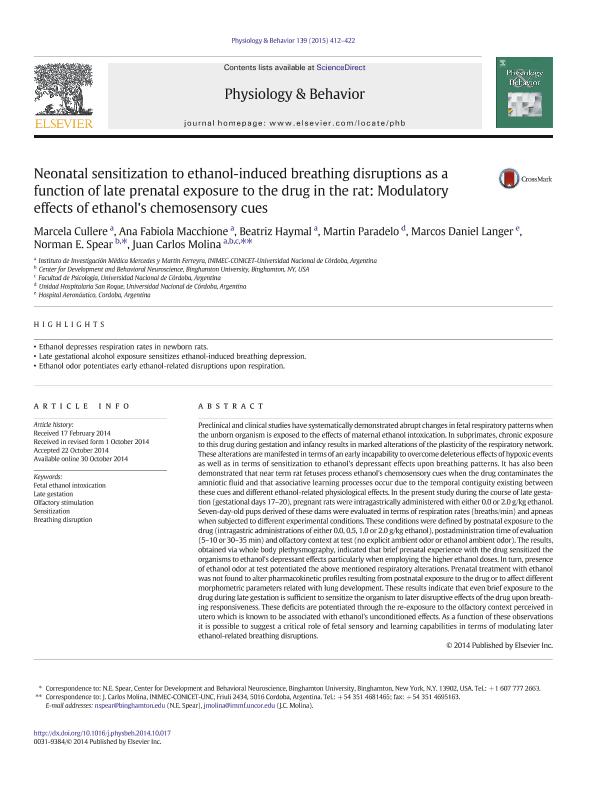Artículo
Neonatal sensitization to ethanol-induced breathing disruptions as a function of late prenatal exposure to the drug in the rat: Modulatory effects of ethanol's chemosensory cues
Culleré, Marcela Elena ; Macchione, Ana Fabiola
; Macchione, Ana Fabiola ; Haymal, Olga Beatriz
; Haymal, Olga Beatriz ; Paradelo, Martin; Langer, Marcos Daniel; Spear, Norman E.; Molina, Juan Carlos
; Paradelo, Martin; Langer, Marcos Daniel; Spear, Norman E.; Molina, Juan Carlos
 ; Macchione, Ana Fabiola
; Macchione, Ana Fabiola ; Haymal, Olga Beatriz
; Haymal, Olga Beatriz ; Paradelo, Martin; Langer, Marcos Daniel; Spear, Norman E.; Molina, Juan Carlos
; Paradelo, Martin; Langer, Marcos Daniel; Spear, Norman E.; Molina, Juan Carlos
Fecha de publicación:
02/2015
Editorial:
Pergamon-Elsevier Science Ltd
Revista:
Physiology And Behavior
ISSN:
0031-9384
Idioma:
Inglés
Tipo de recurso:
Artículo publicado
Clasificación temática:
Resumen
Preclinical and clinical studies have systematically demonstrated abrupt changes in fetal respiratory patterns when the unborn organism is exposed to the effects of maternal ethanol intoxication. In subprimates, chronic exposure to this drug during gestation and infancy results in marked alterations of the plasticity of the respiratory network. These alterations are manifested in terms of an early incapability to overcome deleterious effects of hypoxic events as well as in terms of sensitization to ethanol's depressant effects upon breathing patterns. It has also been demonstrated that near term rat fetuses process ethanol's chemosensory cues when the drug contaminates the amniotic fluid and that associative learning processes occur due to the temporal contiguity existing between these cues and different ethanol-related physiological effects. In the present study during the course of late gestation (gestational days 17-20), pregnant rats were intragastrically administered with either 0.0 or 2.0. g/kg ethanol. Seven-day-old pups derived of these dams were evaluated in terms of respiration rates (breaths/min) and apneas when subjected to different experimental conditions. These conditions were defined by postnatal exposure to the drug (intragastric administrations of either 0.0, 0.5, 1.0 or 2.0. g/kg ethanol), postadministration time of evaluation (5-10 or 30-35. min) and olfactory context at test (no explicit ambient odor or ethanol ambient odor). The results, obtained via whole body plethysmography, indicated that brief prenatal experience with the drug sensitized the organisms to ethanol's depressant effects particularly when employing the higher ethanol doses. In turn, presence of ethanol odor at test potentiated the above mentioned respiratory alterations. Prenatal treatment with ethanol was not found to alter pharmacokinetic profiles resulting from postnatal exposure to the drug or to affect different morphometric parameters related with lung development. These results indicate that even brief exposure to the drug during late gestation is sufficient to sensitize the organism to later disruptive effects of the drug upon breathing responsiveness. These deficits are potentiated through the re-exposure to the olfactory context perceived in utero which is known to be associated with ethanol's unconditioned effects. As a function of these observations it is possible to suggest a critical role of fetal sensory and learning capabilities in terms of modulating later ethanol-related breathing disruptions.
Archivos asociados
Licencia
Identificadores
Colecciones
Articulos(INIMEC - CONICET)
Articulos de INSTITUTO DE INV. MEDICAS MERCEDES Y MARTIN FERREYRA
Articulos de INSTITUTO DE INV. MEDICAS MERCEDES Y MARTIN FERREYRA
Citación
Culleré, Marcela Elena; Macchione, Ana Fabiola; Haymal, Olga Beatriz; Paradelo, Martin; Langer, Marcos Daniel; et al.; Neonatal sensitization to ethanol-induced breathing disruptions as a function of late prenatal exposure to the drug in the rat: Modulatory effects of ethanol's chemosensory cues; Pergamon-Elsevier Science Ltd; Physiology And Behavior; 139; 2-2015; 412-422
Compartir
Altmétricas



